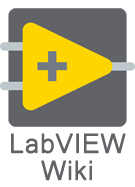Control
A Control is an input element on the Front Panel of a VI that allows users to interact with (control) a VI at runtime. When a control is connected to a terminal on the Connector pane, it serves as an input terminal to pass data into a VI. A control can also be changed into an indicator via the right-click menu option Change to Indicator. Controls on a front panel are always stored as part of the owning VI. Individual controls can be stored in a control file on disk for later re-use. Control files are created and changed in the control editor.
Controls include: Knobs, Push Buttons, Strings (text input), Dials, etc. Controls to place on a front panel are accessed through the Controls Palette or through Quick Drop.
Styles of Controls
There are many styles of controls that come with LabVIEW. These sets of controls are listed below; however, there are also many third-party toolkits with various styles available and a Control editor that allows for the creation of custom controls.
Classic Controls
The Classic controls are the original set of controls. See the Classic Controls Palette.
| |
Example Picture Place Holder |
Modern Controls
The Modern controls came out in LabVIEW 6i to incorporate a more 3D look of controls. See the Modern Controls Palette.
| |
Example Picture Place Holder |
System Controls
The System controls uses the control style from the Operating System (OS). If these are used, be aware that the look of the application could change if used in a different OS (for example: developing in Windows 7 and then upgrading to Windows 10). See the System Controls Palette.
| |
Example Picture Place Holder |
Silver Controls
The Silver controls came out in LabVIEW 2011 to try to address the concerns that user interfaces were beginning to look dated. See the Silver Controls Palette.
| |
Example Picture Place Holder |
NXG Controls
The NXG controls came out in LabVIEW 2018 to allow creation of LabVIEW user interfaces that look like LabVIEW NXG user interfaces. See the NXG Style Controls Palette.
| |
Example Picture Place Holder |
